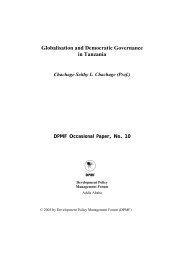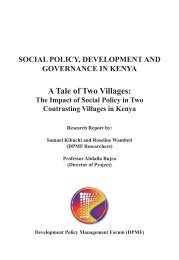From the Lagos Plan of Action (LPA) - DPMF.org
From the Lagos Plan of Action (LPA) - DPMF.org
From the Lagos Plan of Action (LPA) - DPMF.org
Create successful ePaper yourself
Turn your PDF publications into a flip-book with our unique Google optimized e-Paper software.
6 <strong>DPMF</strong> Occasional Paper No. 13The <strong>Lagos</strong> <strong>Plan</strong> <strong>of</strong> <strong>Action</strong> (1980)The <strong>LPA</strong> provided <strong>the</strong> framework and strategies for implementingdevelopment programmes. It based its strategies on some importantprinciples to lead to an alternative form <strong>of</strong> development and to take Africaout <strong>of</strong> its crises. These principles relied on:1. Self reliance as <strong>the</strong> basis <strong>of</strong> development – at <strong>the</strong> national, subregionaland regional levels;2. Equity in <strong>the</strong> distribution <strong>of</strong> wealth at <strong>the</strong> national level as afundamental objective <strong>of</strong> development;3. Expansion <strong>of</strong> <strong>the</strong> public sector as an essential element <strong>of</strong>development;4. Direction <strong>of</strong> external capital (viewed as an unavoidable necessity) tothose areas where African capital was most lacking or inadequate –such as mining, energy and large scale projects;5. Inter-African economic cooperation and integration to be effected assoon as possible;6. Africa’s continued fight for a NIEO (New International EconomicOrder) since change in <strong>the</strong> international economic order to favourAfrican and Third World countries was essential.Based on <strong>the</strong>se principles, <strong>the</strong> <strong>LPA</strong> gave primacy to <strong>the</strong> development <strong>of</strong>Agriculture (first for food and <strong>the</strong>n for export), Industrialisation (to satisfybasic needs), Mining Industries (to recover total and permanentsovereignty over national resources and establish mineral basedindustries), Human Resources, Science and Technology.These principles and <strong>the</strong> detailed programme <strong>of</strong> <strong>the</strong> <strong>LPA</strong> were discussedextensively by African Governments and Intellectuals. The latter weregenerally critical <strong>of</strong> <strong>the</strong> details in <strong>the</strong> plan, but strongly supported <strong>the</strong> basicprinciples behind <strong>the</strong> <strong>LPA</strong>. 7The Final Act <strong>of</strong> <strong>Lagos</strong> (1980) and <strong>the</strong> Abuja Treaty (1991)The Heads <strong>of</strong> States and Governments <strong>of</strong> <strong>the</strong> OAU passed <strong>the</strong> specialFinal Act <strong>of</strong> <strong>Lagos</strong>, aimed at achieving an African Common Market by <strong>the</strong>year 2000. The issue <strong>of</strong> economic cooperation and integration was so7 Bujra, A (ed.). Editorial P.I to VI. Africa Development, A Quarterly Journal <strong>of</strong>CODESRIA, Vol. VII, No. 1/2, 1982. A Special Number on <strong>the</strong> <strong>LPA</strong>.




